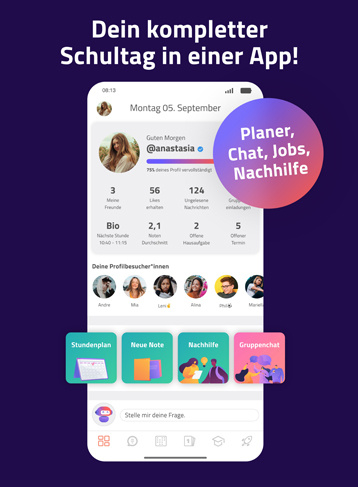Are These Learning Myths Really True?
Right or wrong? There are many myths surrounding learning. We’ve taken a closer look at the most well-known ones and put them through a truth check.

Writing things down helps you learn better.
That's true. When you write something down or copy it, your brain is more engaged with the content than if you just read it. So the saying "through the hand into the memory" is indeed true. However, this only applies to handwriting! If you prefer typing on a computer, you’re out of luck because you focus more on the keyboard than the content of the text.
Learning is best under pressure.
Do you leave everything until the last minute? "Better late than never," right? Waiting until the last minute means you’re just cramming. But this doesn’t help you truly understand the material.
Exercise helps with learning.
This is true. Regular exercise boosts your happy hormones, improves blood circulation, and ensures better oxygen supply to the brain. All of this has a positive impact and makes learning easier. You don’t need to be a fitness guru. Even moving while studying can help. Try walking around your room slowly with your notes or vocabulary lists and see if it improves your learning. There are even specific exercises that stimulate brain function and promote brain cell connectivity.
Mistakes help with learning.
If you get stuck while learning and have to guess the answer, you are still learning something. Canadian studies have shown that memory performance can even benefit from mistakes. This is only true if your guesses are close to the correct answer. Small bridges help remind you of the right answer.
Glucose tablets during exams.
Everyone knows it! Little glucose packets fly across the classroom to combat that dreaded concentration dip. In reality, the boost is only temporary: Your blood sugar spikes, but then crashes. After about twenty minutes, the magic fades, and you often feel even more tired than before. So, the little packets can only be relied on to a limited extent. It's better to start your day with a good breakfast. "Good carbs" that last longer, like muesli or whole grain bread with fresh cheese. Throughout the day, snack on fruits and a few nuts. And don't forget plenty of water because what you often mistake for sweet cravings is actually just thirst. With enough fluids, your brain will work much better.
Text + Highlighter = ❤️
Not entirely true! Highlighters are only really helpful if you use them correctly. Highlighting every word in every color will not help you much. The right way: When reading, filter out and highlight only the most important things.
Learning is easier with music.
Again, not completely true! Fast and very loud music with hard basses won’t help anyone study. Instrumental tracks (preferably without vocals) and smooth, calm melodies are best. So, it’s better to study to the Animal Crossing soundtrack than the latest BTS song. If you use certain music exclusively for studying, it can also become a nice ritual that helps you get into the right mindset for focused learning.
Learn in your sleep.
Uh, no! At least when it comes to the age-old myth that you just need to listen to the study material while sleeping. Active listening, which is necessary for learning, is not possible during sleep. Your brain is already busy doing other important tasks at night. While you sleep, it goes through all the information and learning material from the day, which is important for your long-term memory.
Author: Team scoolio





